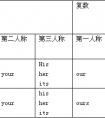句型转换。1. There are some girls in the classroom.(改为否定句) There_____ _____ girls in the classroom. 2. Are there any girls in your school? (作肯定回答)-七年级英语
none后常跟of短语,其后用复数可数名词或不可数名词。
例如:None of them knows the answer to the question.
⑥both, all
both指两个人、物或群体;
all指三个以上的人、物或群体或泛指一切事物。
例如:My parents are both teachers.
All of my friends are football fans.
⑦every, each
each一般用于指两个或两个以上的人或物,侧重个别;
every用于指三个或三个以上的人或物,侧重全体。而且each所指对象在上下文中已十分明确。
例如:Each student went to see that films. (学生至少二人)
Every student went to the park.(学生至少三人)
⑧other, the other, others, the others, another
other具有名词和形容词性质,既可指人,亦可指物。other常与定冠词the连用。
不定冠词an与other连用则组成another。other只作形容词或代词,表示“其他的,别的”,不可单独使用。
例如:Do you have any other questions?
the other作形容词或代词,特指两者中或两部分的另一个或另一部分。
例如:The bookshop is on the other side of the street.
others相当于“other+名词”,泛指“别的人或物”,只有名词性用法。
例如:Some are planting trees, others are watering them.
the others相当于“the other+名词”,表示“剩下的,其余的”,特指除此之外的全部 人或物。
例如:There are forty-six students in our class. Two of them are foreign, the others are all Chinese.
another作形容词或代词,泛指三个或三个以上不定数目中的“另一个”。
例如:This pen is too expensive, please show me another.
⑨either, neither
either指“两者中的任何一个”;neither指“两者中无一”,具有否定意义。
例如:You can take either half.
Neither of the books is good.
⑩many, much, most
many和much具有名词和形容词的性质,都表示“许多、大量”。
Much一般只能指代或修饰不可数名词,many只能指代或修饰复数可数名词。Most指“大部分、大多数”。
例如:Many boys like playing soccer.
We have much homework to do every day.
Most students think so.
(11)few, a few, little, a little
a few 和a little 意为“少数、少量”,其意义是肯定的。
A few指代或修饰复数形式的可数名词,a little指代或修饰不可数名词。
Few 和little意为“几乎一点没有”,具有否定意义。
例如:He has a few friends here.
Hurry up! There is little time left.
不定代词大都可以代替名词和形容词,在句中作主语、宾语、表语、定语和状语。
位置
不定代词+形容词
不定代词+to do
作主语
Both of them are teachers.他们两人都是教师。
作宾语
I know nothing about this person.我对这个人一无所知。
作表语
This book is too much for a child.这本书对一个小孩来说太难了。
作定语
There is a little water in the glass.玻璃杯里有一些水。
作状语
I can't find my book anywhere.我在任何地方都不能找到我的书。
修饰不定代词的词,一般情况下要后置。
考点名称:一般疑问句
- 一般疑问句:
是疑问句的一种。通常用yes,no来回答的疑问句叫做一般疑问句。口语中若无特殊含义,句末用升调。
其结构是:系动词be/助动词/情态动词+主语+其他成分?
通常回答为:
肯定:Yes+主语+提问的助动词
否定:No+主语+提问的助动词+not
例如:
Are you from Japan? Yes, I am./No, I'm not.
Do you live near your school? Yes, I do./No, I don't.
Can you speak French? Yes, I can./No, I can't. - 一般疑问句的特性:
1.将陈述句变为一般疑问句时,如句中有be 动词(am/ is/ are)时,可直接将它们提至主语前。
如主语为第一人称,应将其改为第二人称。如:
I'm in Class 2Grade 1. →Are you in Class 2Grade 1﹖
We're watching TV. →Are you watching TV﹖
2.陈述句中有情态动词(can、may、must …)时,也可直接将它们提至主语前,即可成为一般疑问句。如:
He can swim now. →Can he swim now﹖
The children may come with us. → May the children come with us﹖
3.陈述句中只有一个实义动词作谓语且其时态为一般现在时,变为一般疑问句时要在句首加do或does主语后的实义动词用原形。如:
I like these animals. →Do you like these animals﹖
She wants to go to the movies. → Does she want to go to the movies﹖
4.一般疑问句一般读升调(↑)
5.一般疑问句有时不用yes或 no 回答。如:
Are they in town now﹖
I think so.
May I sit here﹖
Certainly.
Does he like soccer﹖
Sorry I don't know.
6. 一般疑问句的第一单词总是虚词,读的时候要读轻声。 - 陈述句变为一般疑问句技巧:
根据一般疑问句不同的家族,可以用不同的方法将陈述句变为相应的一般疑问句。
1、第一家族:含be动词或情态动词的句子
秘诀:一调二改三问号
一调:即把句中的be或情态动词调到主语前;
二改:改换主语称谓,即将句中的主语I\my \mines\we\our\ours等。第一人称分别改为相应的第二人称you\your\ yours等;
三问号:句末的句号改为问号。如:
Eg. I am an English teacher. → Are you an English teacher?
Eg. We can speak English fluently. → Can you speak English fluently?
2、第二家族:含行为动词(或称为实义动词)的句子
秘诀:一加二改三问号
一加:即在句首加助动词Do或Does;
二改:1、把谓语动词改为原形;2、改换主语称谓(同第一家组);
三问号:句末的句号改为问号。
Eg. We read English every morning. → Do you read English every morning?
Eg. Tom’s father listens to English on the radio every evening. →Does Tom’s father listen to English on the radio every evening?
特别注意:对于第二家族一定要注意动词的还原,因为时态与数的变化已经体现在助动词上了。
3、加强记忆口诀:
肯变一,并不难,can 或be提在前;
谓语若为行为动,do 或does句首用。
考点名称:特殊疑问句
- 特殊疑问句:
以特殊疑问词开头,对句中某一成分提问的句子叫特殊疑问句。
常用的疑问词有:what、who、whose、which、when、where、how、why等。
特殊疑问句的基本结构是“疑问词+一般疑问句”。
其回答应当是具体的。特殊疑问句句末一般用降调。
例如:How do I get there?
Why not?
What about the sports news? - 常用疑问词可先分为3种:
疑问代词:
what(什么)
who(谁,作主语)
which(哪个,在一定范围内选择)
whose(谁的,指附属关系)
whom(谁,作宾语)
疑问副词:
when(何时,询问时间)
where(何地,询问地点)
why(为什么,询问原因)
how(如何,询问手段,方式,工具以及程度)
疑问形容词:
what(which,whose)+名词
例词:
what time(什么时候) what colour(什么颜色)... ...
how much(多少) how long(多长)... - 特殊疑问句的特点:
一、 特殊的疑问词:
特殊疑问句要由疑问代词或疑问副词开头,询问的内容不同, 使用的疑问词也不同。
我们学过的疑问词有what(询问事物), how much(询问价格), what time (询问时间,尤其是点钟), what kind of(询问种类), why(询问原因),who(询问人), where(询问地点) 等等。如:
—What is this? 这是什么?
—It's a key. 这是一把钥匙。
—How much is it? 这个多少钱?
—It's twenty dollars. 二十美元。
—What kind of movies do you like? 你喜欢哪一类型的电影?
—I like action movies. 我喜欢动作片。
- 最新内容
- 相关内容
- 网友推荐
- 图文推荐
上一篇:There_____some meat and some vegetables in the fridge. [ ]A. amB. isC. are D. /-七年级英语
下一篇:There_____ a pen and some books on the desk. [ ]A. is B. are C. am D. be-七年级英语
零零教育社区:论坛热帖子
| [家长教育] 孩子为什么会和父母感情疏离? (2019-07-14) |
| [教师分享] 给远方姐姐的一封信 (2018-11-07) |
| [教师分享] 伸缩门 (2018-11-07) |
| [教师分享] 回家乡 (2018-11-07) |
| [教师分享] 是风味也是人间 (2018-11-07) |
| [教师分享] 一句格言的启示 (2018-11-07) |
| [教师分享] 无规矩不成方圆 (2018-11-07) |
| [教师分享] 第十届全国教育名家论坛有感(二) (2018-11-07) |
| [教师分享] 贪玩的小狗 (2018-11-07) |
| [教师分享] 未命名文章 (2018-11-07) |

![—I want to know if ______ a concert in our school hall this weekend. —Yes. Nancy told me about it. [ ]A. there will have B. there will be C. will there be -九年级英语](http://www.00-edu.com/d/file/ks/4/2/there be juxing/2020-02-28/small8bcf29e494d6f99c2d7c4286c4836a101582899344.jpg)
![There_____ a potato and two tomatoes on the table. [ ]A. isB. areC. hasD. have-七年级英语](http://www.00-edu.com/d/file/ks/4/2/there be juxing/2020-02-28/small596b7df57071a5318d44b4246a8dfcf71582899941.jpg)

![Will there___any schools in the future?[ ]A. isB. areC. amD. be-七年级英语](http://www.00-edu.com/d/file/ks/4/2/there be juxing/2020-02-28/smallfaad594ad286847556f8b2a7bf4e6da41582899915.jpg)
![There is going to _____English movie tonight. [ ]A. be B. be an C. have D. have an -八年级英语](http://www.00-edu.com/d/file/ks/4/2/there be juxing/2020-02-28/small684c03bf16377c6f94e9f828954421a91582899285.jpg)
